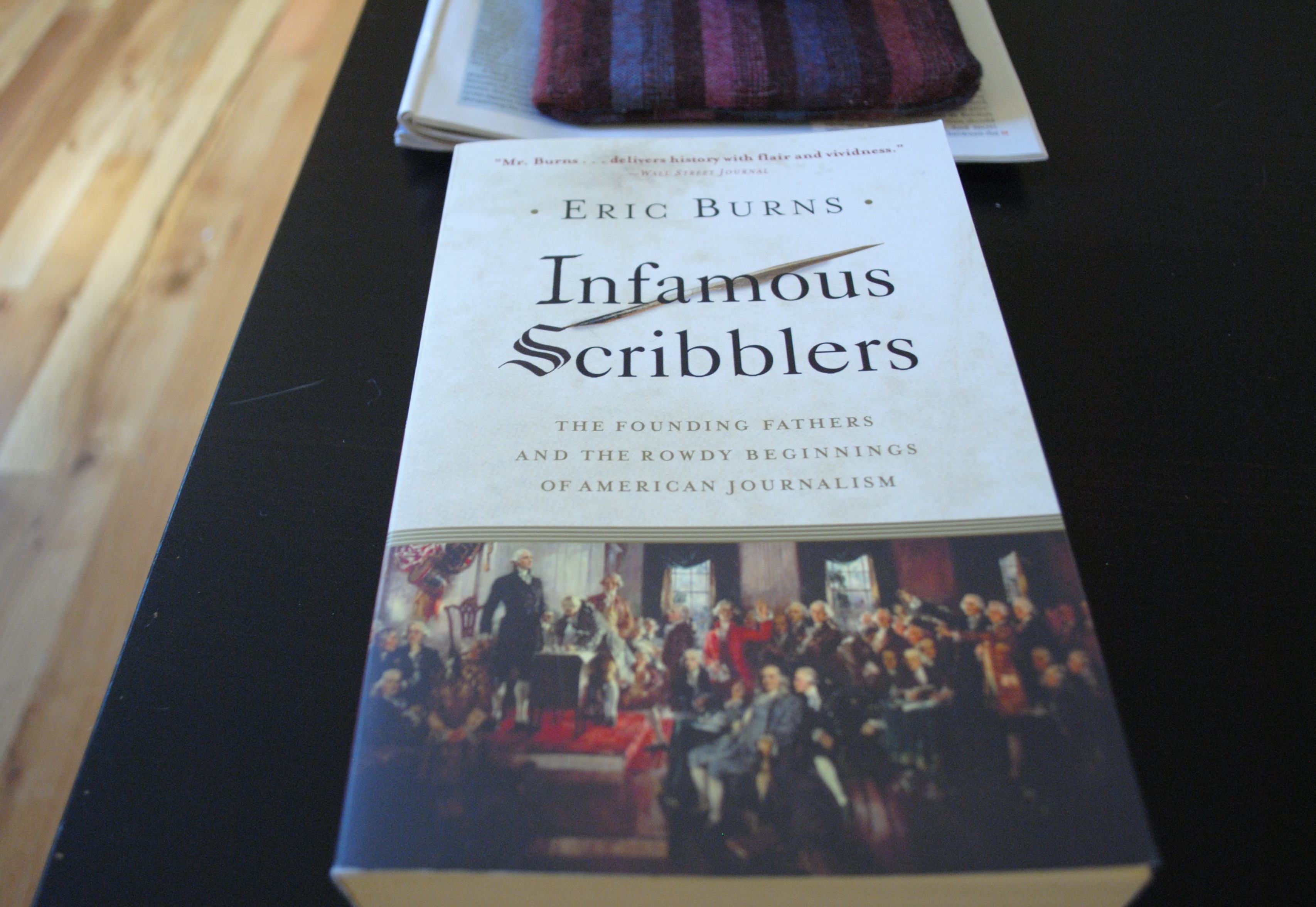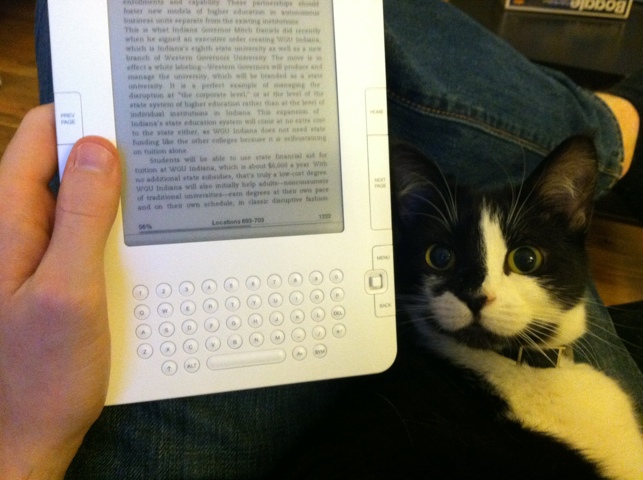Have been feeling pretty sick the last few days. A day off combined with a kitten and good reading cures all. The new Quick Photo mode in WordPress for iOS is pretty cool too. 🙂
Month: May 2011
The Customer Service Happiness Manifesto
The Customer Service Happiness Manifesto. John O’Nolan writes about how to approach customer service. Some terrific advice and details on how to communicate with and cultivate happy users.
Running Towards
A few years ago when traveling I had a meal at a tapas bar on a slow Tuesday night, and struck up a conversation with the chef in the open kitchen. She told me that the key to a good meal is matching the chef’s time: take as much time to eat the dish as it took to prepare it. I always filed it away in my head, but never quite knew how to classify the sentiment. It’s just within the past few days that I’ve understood that the reason I liked the thought so much was because of how kind it seemed. To match attention is to be kind.
Frank Chimero – Running Towards.
What Books Will Become
We’ll debundle books into their constituent bits and pieces and knit those into the web, but the higher level organization of the book will be the focus for attention — that remaining scarcity in our economy. A book is an attention unit. A fact is interesting, an idea is important, but only a story, a good argument, a well-crafted narrative is amazing, never to be forgotten.
Kevin Kelly – What Books Will Become.
Digital Journalism Camp Session Summaries
After a morning unconference session that involved a 5 mile hike with Daniel I caught the afternoon sessions at this weekend’s Digital Journalism Camp.
Journalism startups
First up Melissa Chavez moderated a panel about lessons learned from three journalism startup founders. Michael Andersen of Portland Afoot, Barry Johnson, and Robert Wagner talked about their startups and what they’ve done well (and wrong).
Andersen emphasized how there is plenty of journalism happening, but that it’s mostly for rich people. He’s motivated to create meaningful information for those making under $50,000 a year. In other words, “there’s journalism for those with iPhones but not Samsungs.”
While discussing approaches to building audiences and readership Wagner mentioned that in journalism it really helps if your business is the hub. Being the place where people come to find more information will not only make your property valuable but will tell you a significant amount about your readers. Johnson argued that a journalist should not be afraid to sell. The worlds of journalism and sales are not mutually exclusive in his eyes.
Technology was a key point for all three as well. Wagner mentioned that Cascadia.fm relies heavily on WordPress. He thinks it doesn’t get enough love for all it does. He also pointed out that they don’t have any mobile apps. Cascadia.fm wants to provide the best experience for people to connect with them on the web regardless of device. Andersen said that, “I’ve got to focus on relationships with readers and hope the technology becomes commoditized so I can grab on to that.” Barry Johnson put it succinctly when he said that, “Technology is a practice that is a part of journalism. Journalism will thus be adapted to whatever new technologies come along.”
Unheard voices
The second session of the afternoon was about whether digital tools give marginalized communities a voice. Cornelius Stewart led a panel of 5 that was absolutely fascinating.
Israel Bayer, director of Streetroots, talked about their efforts to bring the homeless into all aspects of journalism. He also noted that, while some think a web presence would undercut street sales, their sister paper in Seattle launched a website and saw their sales increase 40%. He pointed out that it’s the technical parts of a project that are the easy. It’s the relationships and building of a community that are difficult.
Craig Fondren of Sabin Community Development Corporation talked a lot about how they educate their community in the tools of journalism. They focus heavily on bringing many generations into their workshops. As he put it, “If you can get online we have a class for you. If I have your kid in one of our classes then I’m going to get you in a class and I’m going to get grandma too.” They put a lot of work into senior instruction.
One of their driving goals is to get people interested in the tools. Fondren believes that his community will get left behind if we don’t latch on to this tool set. Sabin CDC never charges for a class and they expect those they teach to come back and volunteer. They try to make sure their kids have the skills needed to take part in real world projects. They’ve done work with Trimet, the Oregon Film Council, and many other companies.
The panel also featured Brian Conley and Steve Wyshy of Small World News. They collect video coming out of war and underserved areas and bring it on to the web. Brian had perhaps the quote of the day by describing the proto-journalist:
10,000 years ago a citizen journalist was the guy who went over the next hill and was like, “Hey there’s cool stuff over here!” He was viewed as crazy or was made the village’s chief.
Small World News works for those in Libya, Afghanistan, India, and Egypt. Brian will fly into these countries and train residents in the use of camera equipment and professional-level software like Final Cut Pro. The people then shoot hours of video, make the edits, and send the finished versions to Brian and Steve to post online. In other words, Small World News is working for these people, not the other way around. Once the content is online volunteers subtitle the videos into various languages.
Chicken Fried Bacon
Yesterday I went out to Slappy Cakes for breakfast with some friends. I got pancakes but couldn’t resist the chicken fried bacon as well. It even had a light maple glaze over it all. Absolutely delicious!
Gina Trapani on community
If you can create a culture of teaching and learning within your community like what went on when Greg showed us git, your project will take off. Those moments are more important to the humans involved than any app feature.
Gina Trapani – Your Community Is Your Best Feature.
Merlin Mann on service
Your whole definition of how well that experience went is how little you had to deal with them.
Merlin Mann talking about customer experiences in the service industry in Back to Work #8.
You Can’t Replace Email if You Require Email. Interesting post from Ben Brooks about how Twitter and Facebook are attempting to replace email even as both services rely mightily upon email to work.
Infamous Scribblers

New reading for this week. Infamous Scribblers: The Founding Fathers and the Rowdy Beginnings of American Journalism by Eric Burns.
Last week I finished up Shop Class as Soulcraft by Matthew Crawford. It’s a really wonderful book that has some thought-provoking reflections on life, work, and the meaning of it all.

